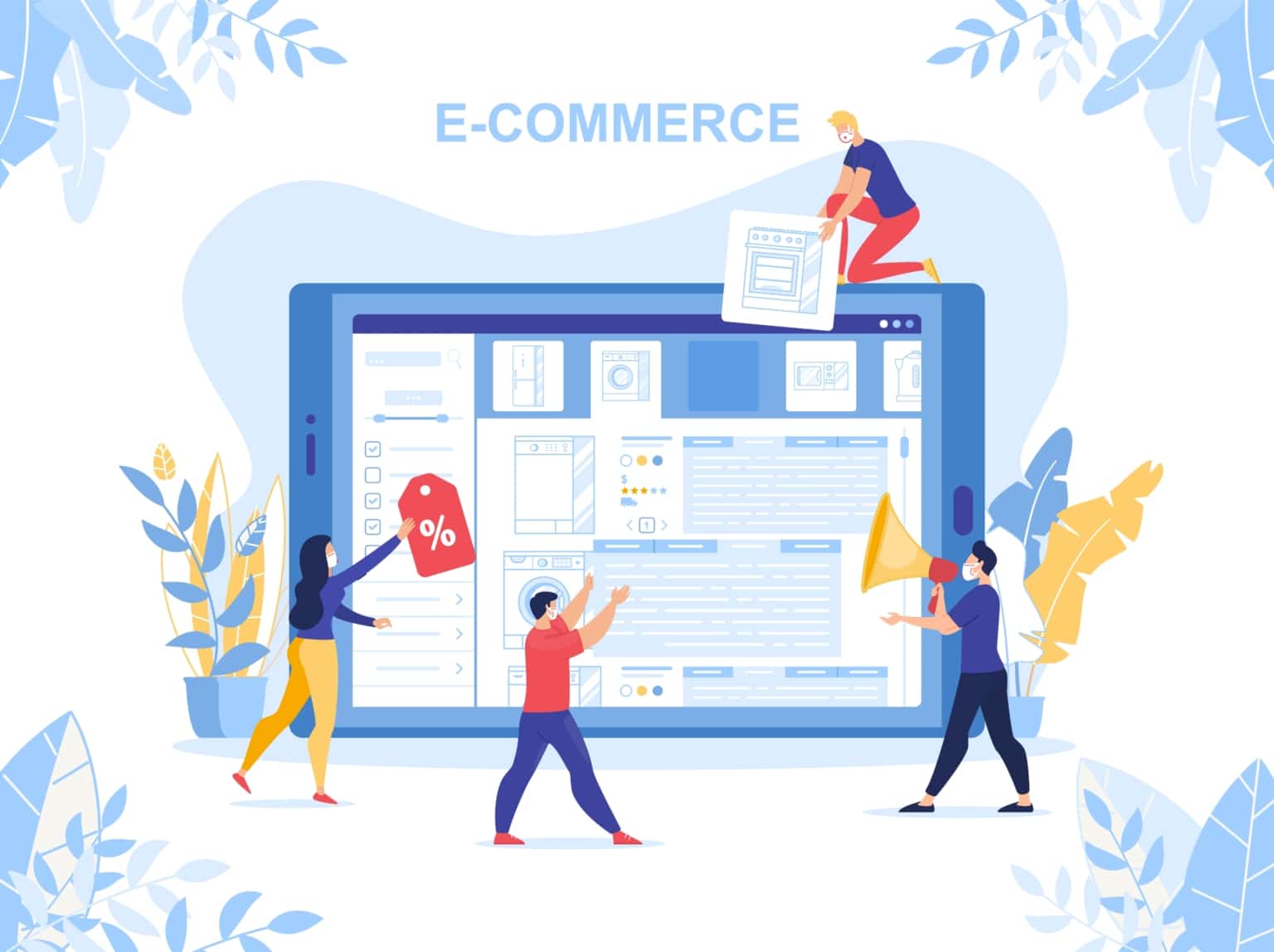RingCentral Content Hubs / eCommerce Resource Hub
eCommerce Resource Hub
Welcome to our eCommerce resource hub. Your go-to destination for all things eCommerce.

What is an eCommerce Business?
An eCommerce business, in simple terms, is an internet-based business. Sometimes e-commerce may be referred to as electronic commerce or internet commerce. In other words, it’s just buying and selling in the online world through an eCommerce solution rather than a physical store. And today, it has become, well and truly, the norm.
Whether big (as is the case for enterprise-level businesses) or small (think independent retailers like Etsy sellers), when goods and services are transacted online, this is eCommerce at work. And, typically, eCommerce businesses facilitate sales via one of four key models.
The Types of Ecommerce Business Models
We’ve mentioned the four types of eCommerce business (B2B, B2C, C2C, and C2B), but what do these acronyms really mean? If you’re thinking of starting an eCommerce business of your own, it’s important to categorise yourself by what you’re providing and to whom you’re providing it.
When we think of eCommerce, most of us imagine online shopping. In other words, we imagine regular folk adding items to a shopping cart and buying products online from a business that supplies those products. But not all eCommerce businesses sell products to consumers.
Each business model has a unique purpose. Let’s take a look in some more detail.
1. B2C
Business to consumer. This is the classic eCommerce situation. A business sells a product or service directly to an individual consumer, usually through a website or mobile app. B2C businesses sell to their end-users. For example, a shoe brand that sells to a customer who wants new shoes.
2. B2B
Business to business. This is when a business sells a product or service directly to another business—for example, SaaS software sold to an enterprise. The buyer might be the end-user, but not necessarily. Sometimes the buyer will resell the product or service (B2C) to a consumer.
3. C2C
This is one you’ve probably done already. Ever sold on eBay, Gumtree, or any other online marketplace? C2C is the consumer to consumer eCommerce, and it happens all day, every day. Consumers are connected to other consumers in an online marketplace.
4. C2B
Customer to business. This is when a customer sells their own products or services directly to a business. In return, they get a payment or fee. C2B platforms like Upwork and Fiverr help individuals sell their products and services to businesses looking for said goods or services.

The Future of Ecommerce
Ecommerce is experiencing monumental growth the world over. In 2019, global eCommerce sales were worth almost 3.5 trillion dollars. Today, eCommerce continues its upward trajectory, with global eCommerce transactions now set to reach a worth of 6.54 trillion US dollars in 2022. But what does such growth mean for the future of eCommerce?
-
Embracing emerging markets
Ecommerce businesses would do well to embrace upcoming and emerging markets shortly. It has been estimated that emerging markets will provide as many as 3 billion additional buyers by 2022 as more and more communities gain access to fast, reliable internet services.
-
Rise of B2B
With SaaS and technology companies growing exponentially, B2B eCommerce is set to multiply. With automation key to today’s industry-wide digital transformation, business to business software providers is set to experience a period of rapid scalability and immense growth.
-
Automation first
Automation is fast becoming the foundation of all online business operations, and eCommerce is no different. From marketing automation to warehousing, customer relationship management to fulfilment distribution, and social media marketing to payment gateway choices, data-led decisions make business smarter and more efficient.
-
Mobile-centricity
Ecommerce is on its way to becoming mobile-centric. Desktop experiences are being sidelined by mobile as more and more of us make our purchasing decisions from our phones and other mobile devices. Research suggests that mobile retail commerce sales (aka m-commerce) are set to make up a monumental 72.9% of all retail eCommerce by 2021. And this trend shows no sign of letting up.
-
Personalisation
User experiences must now be based on personalisation. Customers want real interactions and fast results. Poor personalisation is driving customers away, and user experience is now top of the eCommerce agenda. Get ready for personalised content, chatbots, and lots more AI.
The Pros and Cons of Starting Your Own Ecommerce Business
With so many eCommerce business opportunities at our fingertips, how can we know if starting our own eCommerce business would be a good move financially and personally? There are many advantages to eCommerce, but of course, there are some downsides to consider, too.
Let’s take a look at some of the most important pros and cons when it comes to starting your own eCommerce business.
The pros
-
Low barrier to entry
Starting an eCommerce business doesn’t have to be expensive. You won’t necessarily need a business loan or venture capital to get started. For small business owners, hard-graft and a commitment to learning go a long way. Plus, website hosting is cheap, making it easy to set up your own domain and start attracting new customers to your online platforms. Companies like Shopify or Magento help anyone and everyone to set up an online storefront.
-
Large potential market
Internet users are worldwide, meaning that your potential market segment is huge and set to get even bigger. Your potential customers are geographically dispersed. Luckily, even new brands and first-time eCommerce businesses can sell to customers worldwide thanks to affordable shipping and dropshipping services.
-
24/7 operation
The internet is operational, well, all the time. That means your scope for sales isn’t bound by time. Your store is always open and your checkout operational, no matter where you are or what you’re doing. That means you’ll continue to generate passive income even when you’re fast asleep.
-
Flexibility
Ecommerce is highly flexible. You don’t need expensive premises to get started. Whether your new business is a full-time endeavour or weekend side-hustle, you can work from home according to your schedule and take advantage of the many online resources, software options, and hosting platforms at your disposal.
-
Scope for personalisation
We already spoke about the rise of personalisation culture. Luckily, eCommerce is the perfect setting in which to give customers a personalised experience. Personalised landing pages, chatbots, email marketing, mailing lists, and newsletters contribute to customer satisfaction, retention, loyalty, and sales.
The cons
-
Serious competition
The eCommerce landscape is indeed competitive. To make it in eCommerce, driving maximum traffic to your platforms is key. You’ll need to prioritise digital marketing, search engine optimisation (SEO), and quality content (blogging, podcasts, or webinars, for example) to stay in the game. Uniqueness is key in this saturated ecosystem.
-
Technical issues
Running an eCommerce business means using software and digital tools daily. Unfortunately, these tools go wrong or lose functionality sometimes. IT and technical issues go hand in hand. But this need not derail your business. You’ll need contingency plans for site downtime, glitches, or any other unexpected technical predicaments.
-
Establishing awareness
Even though entry barriers are low, there’s no sidestepping the fact that building reputation, trust, and a name for your business is a much slower process. Customers will need the confidence to invest their hard-earned cash in your business. To push through this initial stage, it’s important to reach out to customers, encourage reviews, and entice interest with promotions, USPs, and personalised content. It’s not like generating interest, building a reputation, and achieving significant retail sales easily with brick and mortar stores either.
Your one-stop shop for better customer experiences
Discover the benefits of cloud communications for retail, no matter which eCommerce model you choose to adopt
How to Start Your Own Ecommerce Business
Steps in Building your own Online Store
Starting any business can feel daunting. But with a robust plan in place, there’s no reason your new venture shouldn’t be a success. When writing a business plan, it’s important to think big-picture—Strategise for scalability, added value, and customer loyalty. There’s a lot that goes into preparing your brand for the online market. It’s not just about the products. Everything from quality to marketing and SEO optimisation to market research is essential in any successful online eCommerce startup.
Building your own online store is a step-by-step process. It helps to start by researching, planning, and strategising a robust business plan. This will help you stay on track and keep your eye on the prize. To get you started, we’ve put together some of our favourite resources to ease you through these first steps. You’ll be able to read about all the foundational actions that any new business needs for successful set-up. So let’s take a closer look.
A step by step guide on starting your own online business in the UK
The perfect starter upper guide for eCommerce newbies. Did you know that 63% of shopping occasions now begin online? This resource discusses the business trends at the root of this change, from AR to AI, and some constructive tips for starting your own online business.
The Ultimate Guide to eCommerce Business Models
Wondering how to categorise your new business? Find the business model that works best for you. This guide will run you through the five business category types and five eCommerce specific business models. You’ll learn how eCommerce takes many different shapes and sizes, from small business dropshipping models to massive enterprise-level operations.
Recession Proof Products To Sell Online (and How To Sell Them)
Looking for a recession-proof, Coronavirus pandemic-proof product? This article will help you identify those products which offer resilience against fragile economies. Ecommerce has proven its worth in transcending difficult times. In this article, you’ll be talked through the best products to sell online, how to identify that all-important gap in the market and gain some actionable tips to start selling your products online in no time.
The Best Ecommerce Product Pages
You believe in your product, but what actually makes it sell? This blog post has the answer. Here we’re dissecting what it is that actually sells a product - starting with the product page. You’ll be able to learn the key elements of any great product page, familiarise yourself with top trends, and browse through 20 of the best examples on the web today. All information that’ll help you boost those all-important conversion rates.
The Guide to Multi-Channel Retail (and Why it Matters)
You’ve probably heard the term multi-channel marketing circulating the ether of late. Well, here’s everything you need to know about it and more. In this comprehensive guide to everything multi-channel retail, you’ll walk through the main advantages and pitfalls of this emerging trend whilst picking up some advice to get you started on your own multi-channel venture.
Guide to eCommerce Marketing Strategies
Let’s talk strategy. Ecommerce is the new normal, with a whopping 98% of global consumers shopping on the web. So what can we do to ace it online? That’s what this guide to eCommerce Marketing Strategies is all about. We’ll run you through the six principal types of eCommerce marketing and offer some top tips for coming up with a high-quality eCommerce marketing plan.
The Guide to Omnichannel Strategies
What is an omnichannel retailing strategy? Good question. In this resource, you can find all the component factors of a robust omnichannel strategy, from customer journey mapping to data organisation through CRM systems. What are the benefits, and what are the potential downfalls? Finally, we’ll let you into our very best tips and tricks for developing a highly competitive omnichannel retail strategy.
10 Ecommerce Trends That Will Thrive in 2021
What exactly is the deal with eCommerce? That’s what this blog post is interested in. Ecommerce is booming, so let’s deep dive into the latest trends that are shaping and revolutionising retail. Gain insight into the latest changes, from mobile-first commerce to AI-powered, omnichannel experiences and BNPL options. We’ll be asking some exciting questions about what the future of eCommerce has in store.
eCommerce Tools and Technology
Must-Have Tools for Your Online Website
To run a successful eCommerce business, you’ll need many fingers in a lot of pies. Realistically, it’s not humanly possible to keep on top of everything simultaneously, day-in-day-out, 24 hours of the day. That’s why eCommerce tools and technologies are essential.
Ecommerce software platforms help even multichannel eCommerce retailers manage their workflows, operations, sales, and shipping from one digital hub. These tools usually include multiple plugins and automation to help streamline workflows and aid data-driven decisions.
There are tonnes of different tools, from website builders to inventory management and fulfilment software, that will help you create and manage your own online website. With so many different technologies on the market today, it can be a bit overwhelming. So we’ve put together some top resources to guide you through some of today’s must-have technologies.
Ultimate List of eCommerce Builders
An eCommerce website builder will help you set up a professional, intuitive website without knowing how to code. But there are so many website builders out there competing for our attention. We’ll start by asking what a website builder actually is before discussing some essential features to look out for and our top ten eCommerce builders on the market today.
The Top eCommerce Platforms to Use in 2021 (and Beyond)
An eCommerce platform is a software application that allows your business to sell products online. But which one is right for you? Every eCommerce platform comes with its own unique features, so there’s no one-size-fits-all solution for every business out there. Here you’ll be able to compare some of the top eCommerce platforms on the market today. We’ve whittled down the pros and cons of each so that you can choose the best software platform for your business.
Top B2B eCommerce Software
Business to business (B2B) trading is a rapidly growing industry. Thanks to the rise of cloud computing platforms, B2B industry leaders embrace technology to manage their online presence. Here you’ll be talked through eCommerce software options from start to finish. Why is B2B eCommerce software useful, and which provider is best for your business?
The Best Retail Management Software in 2021 (and Beyond)
Managing a retail store online is a very different experience from managing an in-store retail operation. If you're thinking of starting your own eCommerce retail store or are in the process of transitioning online, this article is worth a read. What changes are afoot in retail management, and what challenges should we expect in an increasingly online dominated industry? Plus, check out our top three recommended software options for future-proofing your business.
The Ultimate Guide to Mobile eCommerce (and Why You Should Care)
When you shop online, where do you head? Is it to a computer or a smartphone? If it’s the latter, then you’re part of a growing majority of consumers who complete payments online. This blog post is all about the importance of mobile-first eCommerce. How does mobile commerce work, why is it so effective, and how can we optimize our mobile applications to ensure amazing user experiences every single time?
The Guide to Ecommerce Fulfilment
One of the biggest hurdles that go hand-in-hand with eCommerce is delivery fulfilment. With big players like Amazon Prime and eBay offering fast-as-lightning two-day delivery options, the bar has been set high. In this guide to eCommerce fulfilment, we’ll talk about the eCommerce fulfilment process from start to finish and the building blocks of a successful fulfilment operation. Wondering whether to partner with a fulfilment provider? This one’s for you.
Today's customers expect seamless experiences across every device
But 34% of organisations still don’t have the technology to support multiple customer contact channels. To find out how you can get that much needed competitive edge.
How to Grow Your Ecommerce Business
There comes a time in every ecommerce retailer’s life when the need to grow becomes top priority. But how can we reach more customers and pin-down more sales? Here are some actionable steps you can take to scale up, grow, and increase your online profits for the future.
-
Encourage repeat business
Loyal customers are essential for growth and profit margins. It’s easier to sell to someone who is already invested in your business than somebody with no knowledge of your products and services.
But all too many businesses sideline their existing customers in favour of new leads. Encourage customer loyalty with special offers, personalised communications, and loyalty programs. They’ll be bound to return soon.
-
Go global
Don’t restrict your online sales to one country. Ecommerce puts the entire globe at your fingertips. With more and more people gaining internet access by the day, global ecommerce is an obvious choice when it comes to scaling up your operations.
-
Try affiliate marketing
Affiliate marketing is an increasingly popular online marketing strategy that uses third party affiliates to drive traffic to your site, in return for an affiliate commission. An affiliate marketer could be a social influencer, blogger, email list owner, or other large media website.
-
Partner up
One way to grow your business is through networking. Partnering up with a similar, or complimentary, ecommerce website is a great way to do this. You’ll benefit from one another’s existing client bases and offer customers greater choice via your partner.
-
Retarget
Once you’ve nailed it with one particular customer persona, why not try reaching out to a different group. Expanding your targeted marketing campaigns with new advertising material and personalised content could bring a whole new customer base to your site.
Frequently Asked Questions About Ecommerce
-
How do I build an ecommerce business?
Building an ecommerce business is a step by step process. First, you’ll need to research your target audience and market, and find your niche. With a targeted product ready, you can then start branding your business.
Choose a memorable business name and legal business structure from which to work. It’s now time to build your website and stock it with your fabulous products. And finally, ramp up those targeted marketing efforts to maximise traffic to your site that ends in sales.
-
Is ecommerce a good business?
Yes. Ecommece is a highly lucrative business space. The ecommerce industry is on the rise and shows no signs of letting up. More and more of us conduct our shopping online. The ecommerce space is competitive but remains an ecosystem for business opportunity.
-
Is it hard to start an ecommerce business?
Yes and no. Ecommerce is a competitive industry. It can be hard to build a name for yourself and stand out from the crowd. Having said that, barriers to entry are very low. You can set up and start running an ecommerce business quickly and cheaply. So long as you put in the hard work, there’s no reason you shouldn’t see great success in your own business.
-
Do you need a license to sell via ecommerce?
Yes, all ecommerce businesses require a business license to sell online. Failing to obtain these licenses could result in hefty fines and forced closure.
-
What can I sell via ecommerce?
Ecommerce businesses come in all shapes and sizes. Any transaction of money online in exchange for a product or service equates to ecommerce. So really, the possibilities are endless. Whether it’s makeup, smart home devices, subscription boxes, or groceries, it’s all ecommerce at the end of the day.
-
How much does it cost to start an ecommerce business?
This will depend on the nature of your business. For small online retailers, startup costs can be very low indeed. But you’ll need to factor in expenses along the way. Key ecommerce startup expenses include:
-
- Websites – free hosting is available from some ecommerce builders, but professional web design could set you back thousands.
- Domain name – anywhere from $2 to $20 per annum.
- Hosting – pricing ranges from under $10 to upwards of $300 per month.
eCommerce Solutions Tailored For You
We’ll have you up and running in no time. SIGN UP NOW!

Thank You
Thank You for submitting your information! Somebody from our team will contact you shortly.














